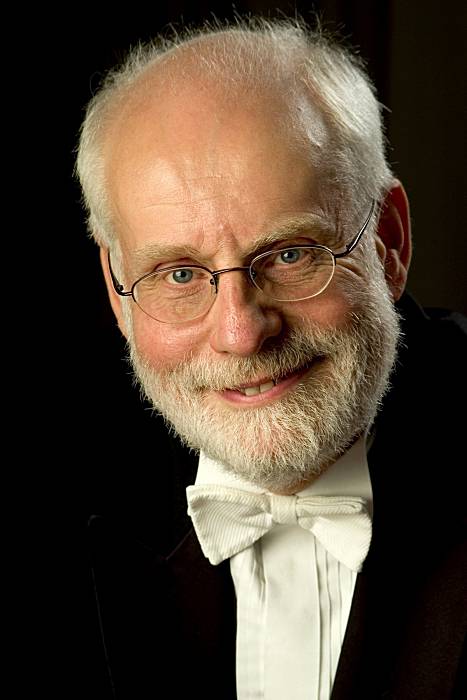RLPO, Koopman, Philharmonic Hall Liverpool | reviews, news & interviews
RLPO, Koopman, Philharmonic Hall Liverpool
RLPO, Koopman, Philharmonic Hall Liverpool
Smiling maestro’s first visit extracts Baroque splendour

It was rather like a trip home to see long-lost relatives. Ton Koopman took to the stage at the Liverpool Philharmonic with a broad smile. That smile both greeted the audience and, from what the audience could see, told the orchestra that they were on form. Or, on the other hand, it might have been encouraging them to try harder.
The latter was hardly necessary. There have been times when the Royal Liverpool Philharmonic Orchestra reduced its ranks to become a Baroque ensemble and, in so doing, failed to realise that it needed to leave behind the 19th century bluster and become that bit more focused. That was certainly not the case when Koopman (pictured below) stepped onto the rostrum. He was in charge and he made that clear, in a smiley sort of way. But the results he achieved were magnificent.
 The stylish introduction to Bach’s Third Orchestral Suite in D proved the point. There was a rather untidy, indistinct start to the piece but it soon came together and the rest was inspired. A particularly furious fugue rather proved the point: this piece is going to have punch. The famous Air contained some seriously stylised phrasing while the four dance movements which closed the work were particularly explosive, especially after that restful number.
The stylish introduction to Bach’s Third Orchestral Suite in D proved the point. There was a rather untidy, indistinct start to the piece but it soon came together and the rest was inspired. A particularly furious fugue rather proved the point: this piece is going to have punch. The famous Air contained some seriously stylised phrasing while the four dance movements which closed the work were particularly explosive, especially after that restful number.
As if that was not enough, there followed Handel's Music for the Royal Fireworks. It started in a solid, almost staid, manner that soon gave way to a furious fugue. That continued: anyone attempting to dance the Bourrée might have needed assistance to breathe. And so this lively suite went on. Joyous, uplifting, call it what you will. It pleased the audience, to the point that they had no idea that the suite had ended and Koopman almost had to walk off before the first ripple of applause went through the hall.
There were serious balance problems with the Haydn "Heiligmesse", his Missa Sancti Bernardi von Offida. The full forces of a splendidly rehearsed Royal Liverpool Philharmonic Choir were pitted against the reduced Baroque forces of the RLPO. It’s not often that the choir drowns out the orchestra, but this was the case here. Halving the size of the chorus would have worked better, possibly.
The choir was bright, its diction was perfect, and it was ever lively. It’s a great piece to sing: it sounded fresh, full of inventive passages and sufficient challenge to keep the chorus on its toes. And they rose to the challenge without question. The four soloists were, like Koopman, first-time visitors to the stage of the Philharmonic. Star of the quartet was Cuban tenor Ariel Hernández Roque: a silky-voiced singer with great diction and good presence. The bass, Jasper Schweppe – from Zwolle, the same city as Koopman – felt weak, while the Polish mezzo Bogna Bartosz and Cuban soprano Yetzabel Arias Fernandez gave adequate, if rather run-of-the-mill performances.
rating
Explore topics
Share this article
The future of Arts Journalism
You can stop theartsdesk.com closing!
We urgently need financing to survive. Our fundraising drive has thus far raised £49,000 but we need to reach £100,000 or we will be forced to close. Please contribute here: https://gofund.me/c3f6033d
And if you can forward this information to anyone who might assist, we’d be grateful.

Subscribe to theartsdesk.com
Thank you for continuing to read our work on theartsdesk.com. For unlimited access to every article in its entirety, including our archive of more than 15,000 pieces, we're asking for £5 per month or £40 per year. We feel it's a very good deal, and hope you do too.
To take a subscription now simply click here.
And if you're looking for that extra gift for a friend or family member, why not treat them to a theartsdesk.com gift subscription?
more Classical music
 Bizet in 150th anniversary year: rich and rare French offerings from Palazzetto Bru Zane
Specialists in French romantic music unveil a treasure trove both live and on disc
Bizet in 150th anniversary year: rich and rare French offerings from Palazzetto Bru Zane
Specialists in French romantic music unveil a treasure trove both live and on disc
 Scottish Chamber Orchestra, Ibragimova, Queen’s Hall, Edinburgh review - rarities, novelties and drumrolls
A pity the SCO didn't pick a better showcase for a shining guest artist
Scottish Chamber Orchestra, Ibragimova, Queen’s Hall, Edinburgh review - rarities, novelties and drumrolls
A pity the SCO didn't pick a better showcase for a shining guest artist
 Kilsby, Parkes, Sinfonia of London, Wilson, Barbican review - string things zing and sing in expert hands
British masterpieces for strings plus other-worldly tenor and horn - and a muscular rarity
Kilsby, Parkes, Sinfonia of London, Wilson, Barbican review - string things zing and sing in expert hands
British masterpieces for strings plus other-worldly tenor and horn - and a muscular rarity
 From Historical to Hip-Hop, Classically Black Music Festival, Kings Place review - a cluster of impressive stars for the future
From quasi-Mozartian elegance to the gritty humour of a kitchen inspection
From Historical to Hip-Hop, Classically Black Music Festival, Kings Place review - a cluster of impressive stars for the future
From quasi-Mozartian elegance to the gritty humour of a kitchen inspection
 Shibe, LSO, Adès, Barbican review - gaudy and glorious new music alongside serene Sibelius
Adès’s passion makes persuasive case for the music he loves, both new and old
Shibe, LSO, Adès, Barbican review - gaudy and glorious new music alongside serene Sibelius
Adès’s passion makes persuasive case for the music he loves, both new and old
 Anja Mittermüller, Richard Fu, Wigmore Hall review - a glorious hall debut
The Austrian mezzo shines - at the age of 22
Anja Mittermüller, Richard Fu, Wigmore Hall review - a glorious hall debut
The Austrian mezzo shines - at the age of 22
 First Person: clarinettist Oliver Pashley on the new horizons of The Hermes Experiment's latest album
Compositions by members of this unusual quartet feature for the first time
First Person: clarinettist Oliver Pashley on the new horizons of The Hermes Experiment's latest album
Compositions by members of this unusual quartet feature for the first time
 Gesualdo Passione, Les Arts Florissants, Amala Dior Company, Barbican review - inspired collaboration excavates the music's humanity
At times it was like watching an anarchic religious procession
Gesualdo Passione, Les Arts Florissants, Amala Dior Company, Barbican review - inspired collaboration excavates the music's humanity
At times it was like watching an anarchic religious procession
 Classical CDs: Camels, concrete and cabaret
An influential American composer's 90th birthday box, plus British piano concertos and a father-and-son duo
Classical CDs: Camels, concrete and cabaret
An influential American composer's 90th birthday box, plus British piano concertos and a father-and-son duo
 Cockerham, Manchester Camerata, Sheen, Martin Harris Centre, Manchester review - re-enacting the dawn of modernism
Two UK premieres added to three miniatures from a seminal event of January 1914
Cockerham, Manchester Camerata, Sheen, Martin Harris Centre, Manchester review - re-enacting the dawn of modernism
Two UK premieres added to three miniatures from a seminal event of January 1914
 Kempf, Brno Philharmonic, Davies, Bridgewater Hall, Manchester review - European tradition meets American jazz
Bouncing Czechs enjoy their Gershwin and Brubeck alongside Janáček and Dvořák
Kempf, Brno Philharmonic, Davies, Bridgewater Hall, Manchester review - European tradition meets American jazz
Bouncing Czechs enjoy their Gershwin and Brubeck alongside Janáček and Dvořák
 Solomon, OAE, Butt, QEH review - daft Biblical whitewashing with great choruses
Even a top soprano and mezzo can’t make this Handel paean wholly convincing
Solomon, OAE, Butt, QEH review - daft Biblical whitewashing with great choruses
Even a top soprano and mezzo can’t make this Handel paean wholly convincing

Add comment